How long can chickens go without water?
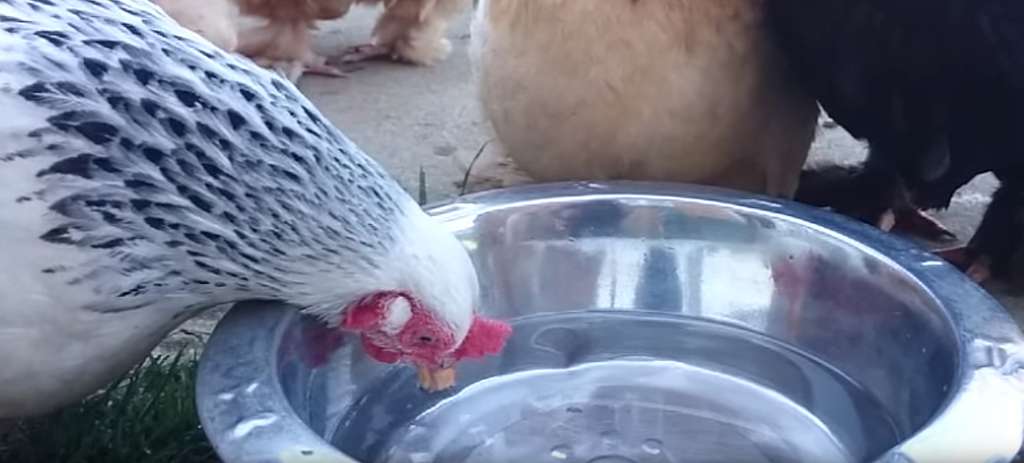
A chicken can survive for 48 hours or two full days without access to water. Less if the conditions are warm and sunny. They will begin to die very rapidly after that. Chickens kept in really hot climates will begin to die within 12 hours not having any water.
Baby chicks can survive up to 12 hours without water after which they will begin to die very quickly. Brooders are often kept warm and this effects how long young chicks can last without access to water.
Lack of water for chickens can be such a shock that hens in full lay that are left without water may stop laying for a week or two afterwards so it is something to be avoided.
Below: Chickens need plenty of clean fresh water.
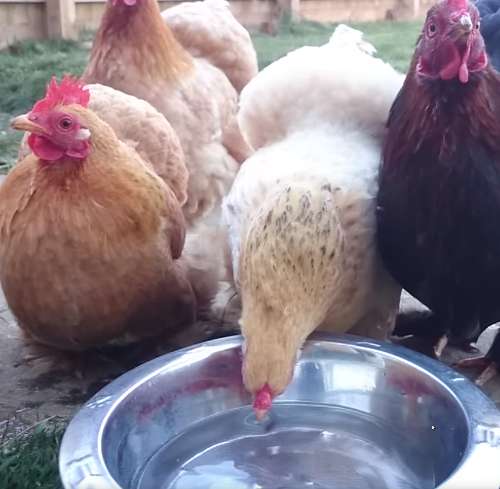
When chickens are left without water the crop will dry out and is unable to moisten the food and digestion stops.
After about 24-hours without water chickens become unable to regulate their body temperature and will have to find cover from the heat or maybe come cold. Either way they will begin to suffer from this point on.
Ice, snow and freezing temperatures are also a problem:
In winter a chicken can survive for 72 hours without water. You get a little longer as it is cooler and the hens are often taking a break from laying eggs reducing the need for water.
If you live in a part of the world that suffers winter freezing your chickens are just as likely to go without water because it's frozen solid.
Cockerels may be able to go a bit longer without water as they do not have to lay eggs.
My own experiences with chickens not having enough water include a weekend last winter when some of my birds were frozen into their coup for 2 days and 3 nights. They all survived just fine even though there was nearly 5 foot of snow trapping them in.
Chickens will eat snow and try to peck holes in the ice covering their water if they are desperate but it is not good for them in the long run.
Lack of water in winter is a little less of a problem as most hens are taking a break from laying eggs and have already finished moulting and regrowing their feathers so are in a resting phase.
Below: Winter can be as much as a problem as the heat of summer when it comes to water.
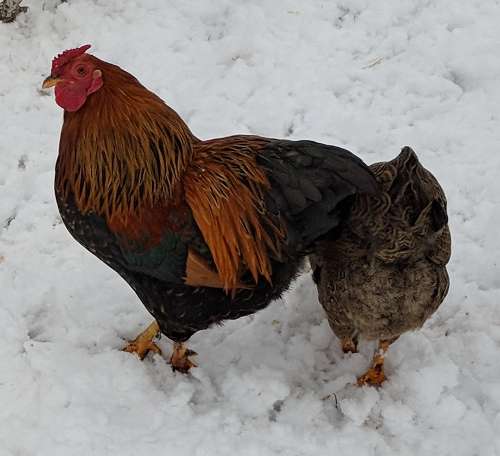
The other time I had a problem was when I found one of my Orpingtons underneath a plastic flower pot. She had been there 3 days and was a little thin but OK. It had rained so I think she had got some water.
Luckily both times I had water problems it was in winter so he wasn't an issue and most of the birds and stop laying eggs.
How much water does a hen need every day?
Studies in commercial hens show the chickens drink between 180 and 250 ml of water every day. This was in indoor flocks of chickens and birds that are kept outdoors could easily drink twice this match. You should consider providing at least half litre of water per chicken per day.
Meat chickens or boilers because of their high growth rate drink more often than this and could easily consume 1 litre of water a day.
Confined chickens may drink more than free range birds because they eat only dry chicken feed whereas free range chickens get bugs and greens, both of which have a high water content.
For more on the daily watering of chickens.
How much water do chicks or baby chickens need?
More than 6 hours without water could be harmful to baby chickens or chicks.
Below: Chicks or baby chickens need shallow water dishes.
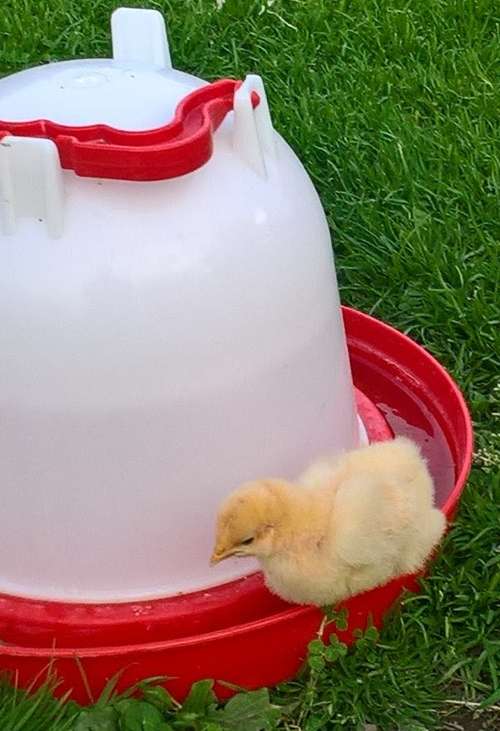
Chicks or baby chickens are kept in the warm environment of the brooder and require water for cooling as well as all the normal biological processes of adults.
Chicks drink smaller amounts on a more regular basis and will suffer and die much more quickly than adults as they do not have the reserves.
When baby chickens first hatch the yolk will provide them with everything the need for the first 72 hours but after that they need water all the time.
Tips for watering chicks.
- Keep the waterers and pipes clean.
- Raise them up off the ground so as scratching chickens don't foul the drinking water.
- Always have two sources of water.
- Keep the water in shade.
- Try to put the water vessel where it can't be seen by wild birds and animals.
- A splash of ACV or Apple Cider Vinegar once a week is most beneficial.
What should you do if your chickens have been left without water?
Give them water before feed. If you give your chickens food first they will not have the moisture necessary in the crop and may suffer crop problems.
Impacted crop sometimes caused buy chickens gorging on food when there's no water.
Give them feed that is wet to help get things going. A few soaked and boiled whole grains may help as they are easy to digest.
What do chickens need water for?
- Drinking - Especially in warm climates.
- Digestion - Food needs moisture for the absorption of nutrients.
- Waste removal - Waster removal requires damp conditions.
- Temp regulation - Chickens drink more on hot days.
- Eggs are 70% water - At least half of a hens water consumption goes toward producing the egg.
Can chickens be left all night without water?
Chickens are just fine going all night without water and it is better that there is no water in the coop, only in the run or out on pasture.
In much the same way as a human can go 10 to 12 hours without water so can your pet chickens.
Below: A homemade bucket waterer. These freeze very easily.
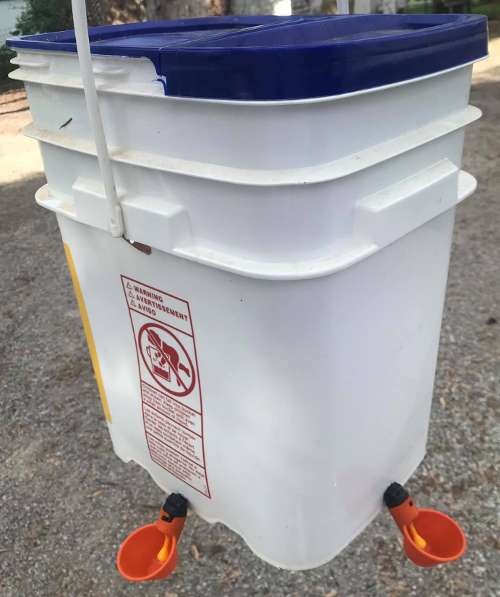
In fact it's better that you don't keep water in the chicken coop overnight. It helps prevent damp and rat problems.
Having water in the run or available when there on pasture is all that you need.
Do chickens need fresh water everyday?
Yes chickens need fresh water everyday. I give mine fresh water twice a day in summer and if you live somewhere really warm you may need to give them fresh water three or 4 times a day.
Below: Chickens will learn to use many different types of waterers. This one is drinking happily from a nipple drinker.
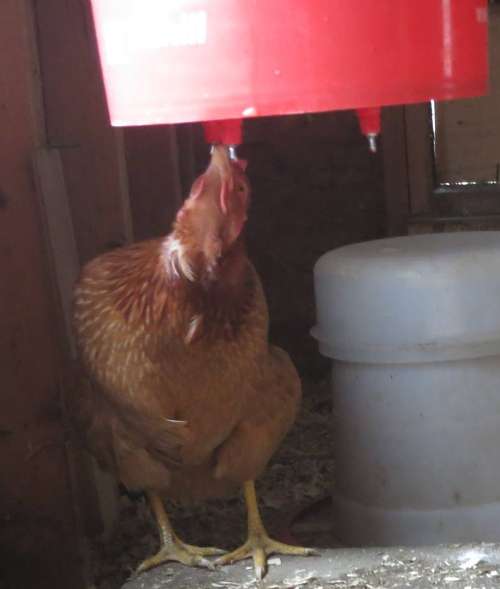
The water you provide your hens should be as clean as you can find. You can use rainwater to give to chickens but it should be kept in a dark covered barrel until needed.
As a backyard chicken keeper you have a duty of care are to your chickens and you could fall foul of the law by not looking after them properly. Allowing birds to go without water for an extended period of time could easily be classed as cruelty cruelty.
What is the best waterer for chickens?
My personal favourite type of drinker for chickens is the vacuum sealed galvanised drinker like this one. I have half a dozen of these.
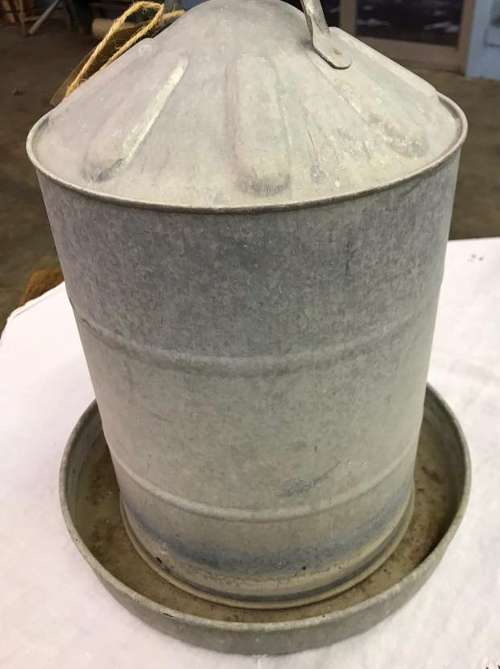
They are simple, easy to fill and clean and everlasting. They do need to be on a level surface though or they drain away.
